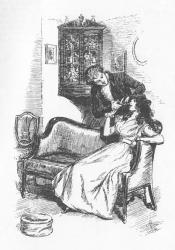Coverture Law and Courtship Etiquette in Regency Era
The idea of coverture is vital to the plot of Sense and Sensibility. Coverture is a practice that began in the Middle Ages under common law but lasted through the Regency Era (The Law of Coverture). Coverture maintained that a woman was legally subordinate to her husband. He managed her money, gained control of her property, and received almost exclusive responsibility of her (Coverture). Dowries were also a part of coverture; a woman’s family paid for her to be married, and this money, again, went exclusively to her husband. Until a woman was married, her affairs were handled by the man of the house, usually her father.
Along with such laws regarding marriage, young men and women were also expected to conform to certain etiquette and societal conventions during courtship. Courtship was the stage prior to engagement that required couples to obey strict rules about behavior. Such rules included not being allowed to call each other by their Christian names, pay each other compliments, or ride in a carriage without a chaperone. Couples were also forbidden from having private correspondence or any sort of intimate contact (Rules of a Regency Courtship). Many of these courtship rules were broken by Marianne and Willoughby, which led those around them to assume an engagement.
Often, during this era, courtship and eventual marriage was more of a business transaction than anything else, usually because of the idea of coverture. Edward Ferrars’s engagement to Lucy Steele was not acceptable to his mother because she was poor (Austen). He was expected to marry someone with money so that he could inherit it. Likewise, it is easy to conclude that Willoughby marries Miss Grey because she is rich; Austen writes, “‘But the family are all rich together. Fifty thousand pounds’” (Austen).
The customs and expectations of the Regency Era heavily impacted how and why relationships formed, and it is evident to see how these ideas affect the Dashwood sisters.
There was no official end to coverture, but the passing of other legislature in the mid-19th century slowly moved the practice out of fashion (The Law of Coverture).
Works Cited
Austen, Jane. Sense and Sensibility. 1811.
"Coverture." Britannica, Encyclopedia Britannica, 8 Oct. 2007, www.britannica.com/topic/coverture. Accessed 7 Feb. 2023.
"The Law of Coverture: Why Call a Woman by Her Husband's Name?" Amazing Women in History, amazingwomeninhistory.com/law-of-coverture-why-call-a-woman-by-her-husbands-name/. Accessed 7 Feb. 2023.
"Rules of a Regency Courtship." Random Bits of Fascination, 11 Feb. 2021, randombitsoffascination.com/2021/02/11/rules-of-a-regency-courtship/. Accessed 7 Feb. 2023.

